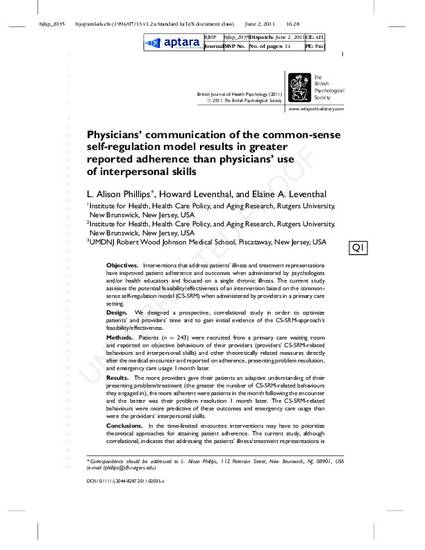
Article
Physicians’ communication of the common-sense self-regulation model results in greater reported adherence than physicians’ use of interpersonal skills
British Journal of Health Psychology
(2012)
Abstract
Objectives. Interventions that address patients’ illness and treatment representations have improved patient adherence and outcomes when administered by psychologists and/or health educators and focused on a single chronic illness. The current study assesses the potential feasibility/effectiveness of an intervention based on the common-sense self-regulation model (CS-SRM) when administered by providers in a primary care setting.
Design. We designed a prospective, correlational study in order to optimize patients’ and providers’ time and to gain initial evidence of the CS-SRM-approach's feasibility/effectiveness.
Methods. Patients (n= 243) were recruited from a primary care waiting room and reported on objective behaviours of their providers (providers’ CS-SRM-related behaviours and interpersonal skills) and other theoretically related measures directly after the medical encounter and reported on adherence, presenting problem resolution, and emergency care usage 1 month later.
Results. The more providers gave their patients an adaptive understanding of their presenting problem/treatment (the greater the number of CS-SRM-related behaviours they engaged in), the more adherent were patients in the month following the encounter and the better was their problem resolution 1 month later. The CS-SRM-related behaviours were more predictive of these outcomes and emergency care usage than were the providers’ interpersonal skills.
Conclusions. In the time-limited encounter, interventions may have to prioritize theoretical approaches for attaining patient adherence. The current study, although correlational, indicates that addressing the patients’ illness/treatment representations is more important than the providers’ interpersonal skills for attaining patient adherence and provides preliminary evidence that a CSM-based intervention in the primary care setting may be both feasible and effective.
Disciplines
Publication Date
2012
DOI
10.1111/j.2044-8287.2011.02035.x
Publisher Statement
This is the peer reviewed version of the following article: Phillips, L. A., Leventhal, H., & Leventhal, E. A. (2012). Physicians’ communication of the Common-Sense Self-Regulation Model results in greater reported adherence than physicians’ use of interpersonal-skills. British Journal of Health Psychology, 17(2), 244-257.DOI: 10.1111/j.2044-8287.2011.02035.x, which has been published in final form at http://dx.doi.org/10.1111/j.2044-8287.2011.02035.x. This article may be used for non-commercial purposes in accordance With Wiley Terms and Conditions for self-archiving
Citation Information
L. Alison Phillips, Howard Leventhal and Elaine A. Leventhal. "Physicians’ communication of the common-sense self-regulation model results in greater reported adherence than physicians’ use of interpersonal skills" British Journal of Health Psychology Vol. 17 Iss. 2 (2012) p. 244 - 257 Available at: http://works.bepress.com/lalison-phillips/7/
